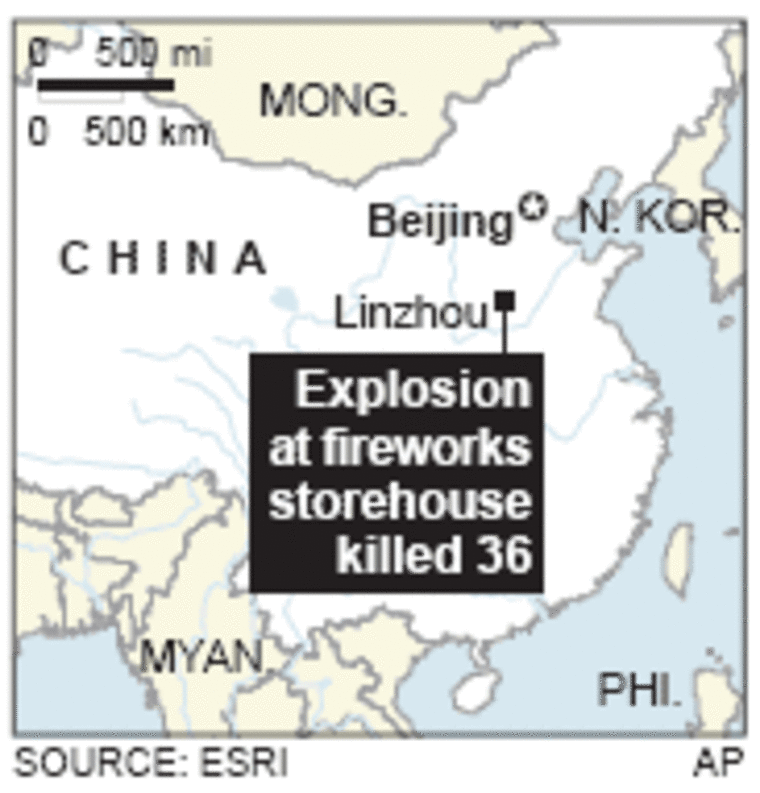The death toll from a Lunar New Year explosion in China’s central province of Henan rose to 36 on Monday, the official Xinhua news agency said.
Many of the victims in Sunday’s blast in Henan’s Linqi town were devout Buddhists burning incense and praying at a temple near a warehouse storing firecrackers, which were ignited by fireworks.
Eight others were listed in critical condition at local hospitals, while 40 more people were slightly injured, Xinhua said. It gave no further details.
In Beijing, residents were allowed to set off fireworks and firecrackers in the city for the first time in 12 years, and used the opportunity with gusto, filling the sky into the early hours with brightly colored explosions.
At midnight on Lunar New Year’s Eve in Shanghai, China’s richest and most cosmopolitan city, clouds of smoke and a rain of red wrappings obscured skyscrapers and explosions shook the windows.
“This will bring me luck in the new year,” said Liu Jian, as he set off a fusillade of fireworks in a Shanghai street that narrowly missed a passing car and forced pedestrians to scatter.
Firecrackers are believed to scare off evil spirits and attract the god of wealth to people’s doorsteps.
Chinese will set off 1 billion yuan’s ($124 million) worth of fireworks and firecrackers over this year’s spring festival period, according to state media, as more than 200 cities lift restrictions on pyrotechnics.
Appeal to the peasants
Elsewhere in China, President Hu Jintao and Premier Wen Jiabao spent the Lunar New Year in the countryside.

Hu visited the old revolutionary base of Yanan in dusty, central Shaanxi province and joined villagers in a folk dance.
State television showed him frying rice cakes in a peasant’s house and promising that the government was working hard to raise living standards in the countryside.
Wen went to the eastern province of Shandong and gave money to a farmer with a sick wife. He visited a local clinic, Xinhua news agency said, and talked about improving the rural health care system.
China is planning to expand pilot programs that provide subsidized medical care, with the goal of covering all rural residents in a new collective medical system by 2010.
In previous years, Chinese leaders have spent new year with everyone from AIDS victims to coal miners, usually as a way of promoting a particular policy.
Lunar New Year — or Spring Festival as it is widely known — is a time for family reunions across China. An estimated 144 million people — equivalent to the population of Bangladesh — have crammed onto trains in recent days to return from the cities to visit relatives.
Dumplings and gold
Many Chinese saw in the New Year eating dumplings, which symbolize wealth because their shape resembles traditional Chinese gold and silver ingots.
There are many Spring Festival taboos. Crying on New Year’s Day means you will cry for the rest of the year, and washing your hair signifies washing away good luck.
The word for “four” is avoided, because it sounds like the word for “death,” and using knives or scissors may “cut off” good fortune.
For some, the festival brings nostalgia for a China that is being swept away by breakneck development.
“New Year isn’t as much fun as it used to be,” said Lao Xu, whose childhood home has been razed to make way for the glittering skyscrapers of Shanghai’s Pudong business district.
“Back then, we all lived in smaller houses and everyone knew everyone else,” he said. “Now people live in apartments and stay out of each other’s business, and it isn’t as much fun any more.”
Some worry that New Year traditions are being lost in the country’s headlong economic boom.
“It is being attacked by Western culture,” Henan University Professor Gao Youpeng wrote in the official Guangming Daily, in what he called a “declaration to protect Spring Festival”.
“More and more people, especially the young, have no time to consider the true meaning of the festival and prefer to celebrate the game-like revelry of Western holidays like Christmas and Valentine's Day,” he wrote.